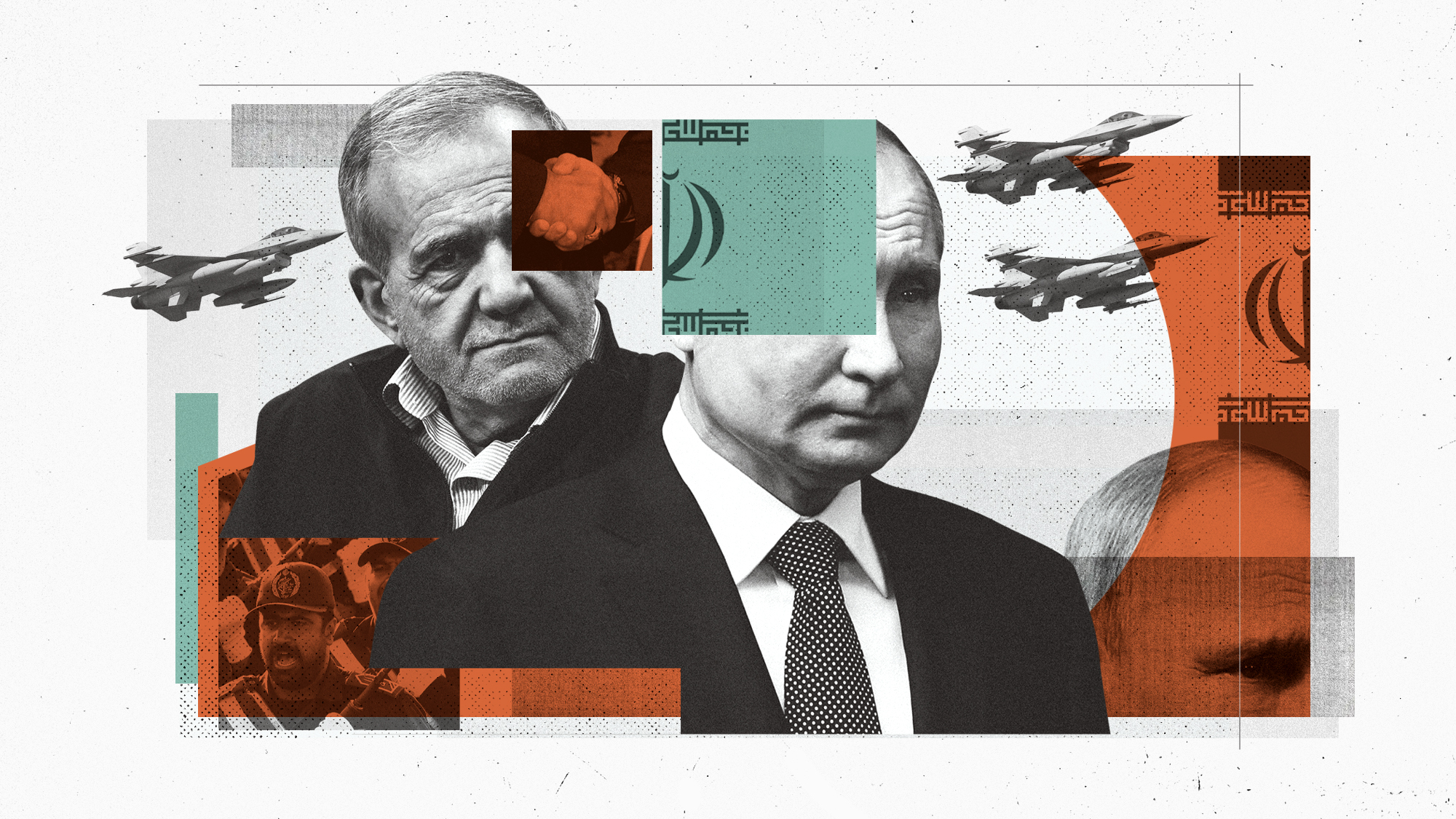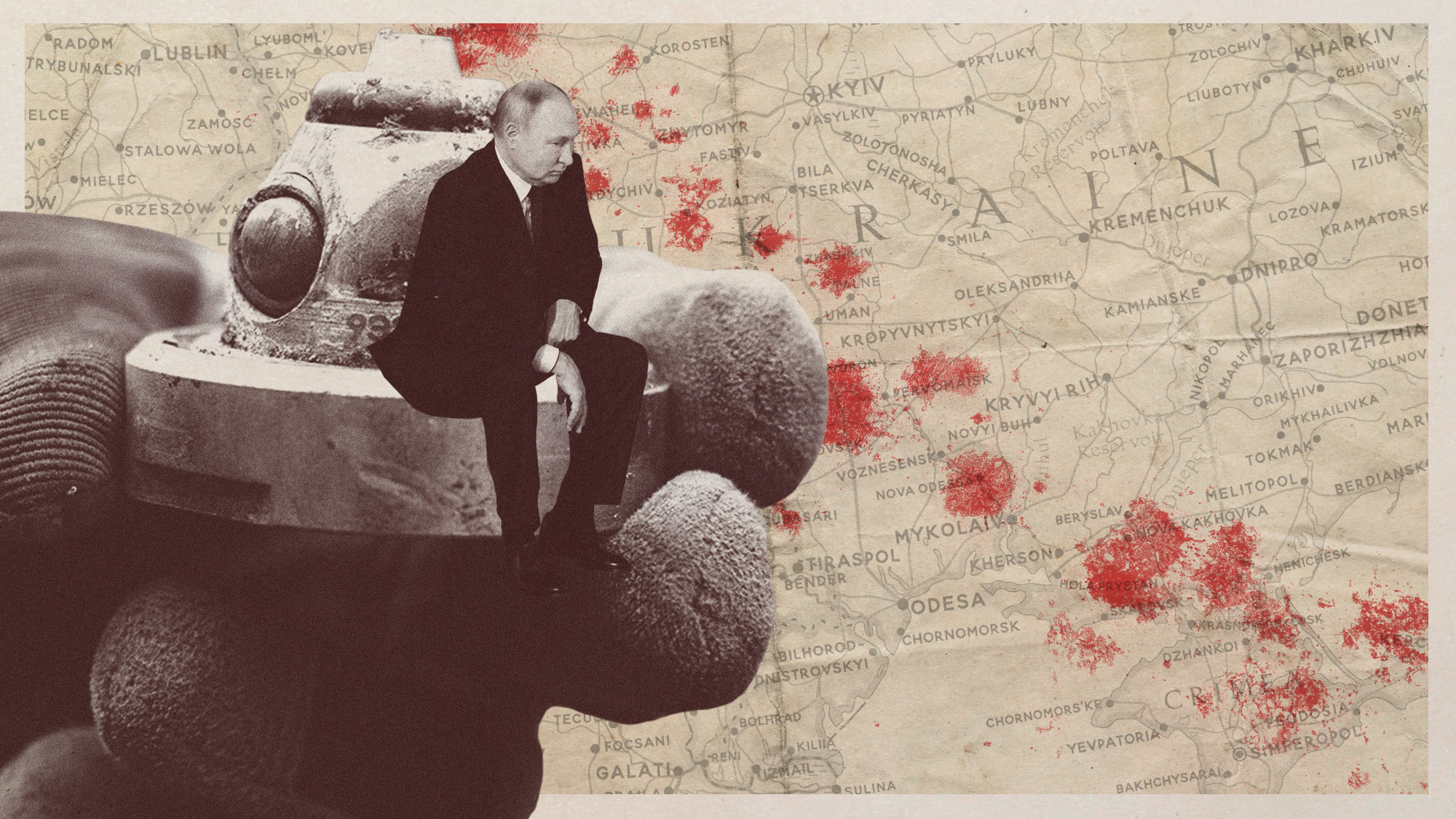Russia and Iran 'up the ante' after meeting in Turkmenistan
Two nations talk up their closer ties but some in Tehran believe Putin 'still owes' them

A free daily email with the biggest news stories of the day – and the best features from TheWeek.com
You are now subscribed
Your newsletter sign-up was successful
Vladimir Putin says he wants to create a "new world order" of Russia's allies after he met Iran's new president, Masoud Pezeshkian, in Turkmenistan.
As tensions escalate in the Middle East, the two leaders "hailed" their "growing economic ties and similar views on world affairs", said Reuters. It is an "entente viewed with concern by the United States".
What do we know about the meeting?
Putin and Pezeshkian met last week at a conference in Turkmenistan celebrating a local poet's 300th birthday – "not an obvious spot" for an international summit, said The Telegraph. It was thought to have been arranged at the last minute, and "a handful of central Asian leaders" confirmed their attendance, "possibly to add credibility".
The Week
Escape your echo chamber. Get the facts behind the news, plus analysis from multiple perspectives.

Sign up for The Week's Free Newsletters
From our morning news briefing to a weekly Good News Newsletter, get the best of The Week delivered directly to your inbox.
From our morning news briefing to a weekly Good News Newsletter, get the best of The Week delivered directly to your inbox.
The Russian foreign ministry said it was the latest evidence that Russia-Iran relations are at an "all-time high", while Pezeshkian said the two countries' positions on global issues "are much closer than those of other states".
The meeting is another sign of the "axis of resistance expanding itself", military analyst Cedric Leighton told CNN. Russia and Iran have had "good relations" in recent years but "now they're upping the ante" and it won't be long before we see an agreement between the two countries with a more "formalised set up" – "an alliance of sorts".
How did we get here?
Since Russia invaded Ukraine in 2022, Tehran and Moscow have grown closer, "building on a partnership forged in the civil war in Syria almost 10 years ago", said The Telegraph.
Iran has sent thousands of drones and short-range missiles to Russia and, according to US officials, built a drone factory there too. In return, Moscow has sent oil to Iran and provided technical know-how. It's rumoured that Putin has also sent fighter jets and missile defence systems Iran's way.
Although the Kremlin has hosted the Iran-backed Hamas and has blamed the West for the escalating conflict in the Middle East, "there is a feeling in Tehran" that Russia "still owes Iran". An unnamed professor at an Iranian university told the Telegraph that "our relationship with Putin resembles that of being friends with someone who never pays their share when you go out", and Iran's state media has criticised Putin for "maintaining his distance" from the Middle East crisis.
A free daily email with the biggest news stories of the day – and the best features from TheWeek.com
Some analysts believe that the conflict in the Middle East has done nothing for Iran-Russia relations, because Putin feels that the fighting between Israel and its neighbours distracts international attention from the war in Ukraine.
Tehran is "probably pressing Russia" for more advanced weapons, said the Financial Times, but Putin will "have to balance" his relationship with Iran against other partners in the Middle East, such as Saudi Arabia and the United Arab Emirates, who "would oppose" any such sales.
Will Russia react if Israel attacks Iran?
Analysts are divided over how Moscow might react to any escalation, said The Telegraph. The US-based Institute for the Study of War said that Putin and Pezeshkian have discussed how to respond to a "potential Israeli retaliation".
But any suggestion of Russian intervention "would be too much in terms of antagonising America and Israel", said Stephen Hall, an assistant professor of Russian politics at the University of Bath. Putin is "still desperately trying to keep Israel away from funding Ukraine".
Chas Newkey-Burden has been part of The Week Digital team for more than a decade and a journalist for 25 years, starting out on the irreverent football weekly 90 Minutes, before moving to lifestyle magazines Loaded and Attitude. He was a columnist for The Big Issue and landed a world exclusive with David Beckham that became the weekly magazine’s bestselling issue. He now writes regularly for The Guardian, The Telegraph, The Independent, Metro, FourFourTwo and the i new site. He is also the author of a number of non-fiction books.
-
 What is the endgame in the DHS shutdown?
What is the endgame in the DHS shutdown?Today’s Big Question Democrats want to rein in ICE’s immigration crackdown
-
 ‘Poor time management isn’t just an inconvenience’
‘Poor time management isn’t just an inconvenience’Instant Opinion Opinion, comment and editorials of the day
-
 Bad Bunny’s Super Bowl: A win for unity
Bad Bunny’s Super Bowl: A win for unityFeature The global superstar's halftime show was a celebration for everyone to enjoy
-
 New START: the final US-Russia nuclear treaty about to expire
New START: the final US-Russia nuclear treaty about to expireThe Explainer The last agreement between Washington and Moscow expires within weeks
-
 What would a UK deployment to Ukraine look like?
What would a UK deployment to Ukraine look like?Today's Big Question Security agreement commits British and French forces in event of ceasefire
-
 Trump peace deal: an offer Zelenskyy can’t refuse?
Trump peace deal: an offer Zelenskyy can’t refuse?Today’s Big Question ‘Unpalatable’ US plan may strengthen embattled Ukrainian president at home
-
 Vladimir Putin’s ‘nuclear tsunami’ missile
Vladimir Putin’s ‘nuclear tsunami’ missileThe Explainer Russian president has boasted that there is no way to intercept the new weapon
-
 How should Nato respond to Putin’s incursions?
How should Nato respond to Putin’s incursions?Today’s big question Russia has breached Nato airspace regularly this month, and nations are primed to respond
-
 Russia’s war games and the threat to Nato
Russia’s war games and the threat to NatoIn depth Incursion into Poland and Zapad 2025 exercises seen as a test for Europe
-
 What will bring Vladimir Putin to the negotiating table?
What will bring Vladimir Putin to the negotiating table?Today’s Big Question With diplomatic efforts stalling, the US and EU turn again to sanctions as Russian drone strikes on Poland risk dramatically escalating conflict
-
 Ottawa Treaty: why are Russia's neighbours leaving anti-landmine agreement?
Ottawa Treaty: why are Russia's neighbours leaving anti-landmine agreement?Today's Big Question Ukraine to follow Poland, Finland, Lithuania, Latvia and Estonia as Nato looks to build a new ‘Iron Curtain' of millions of landmines